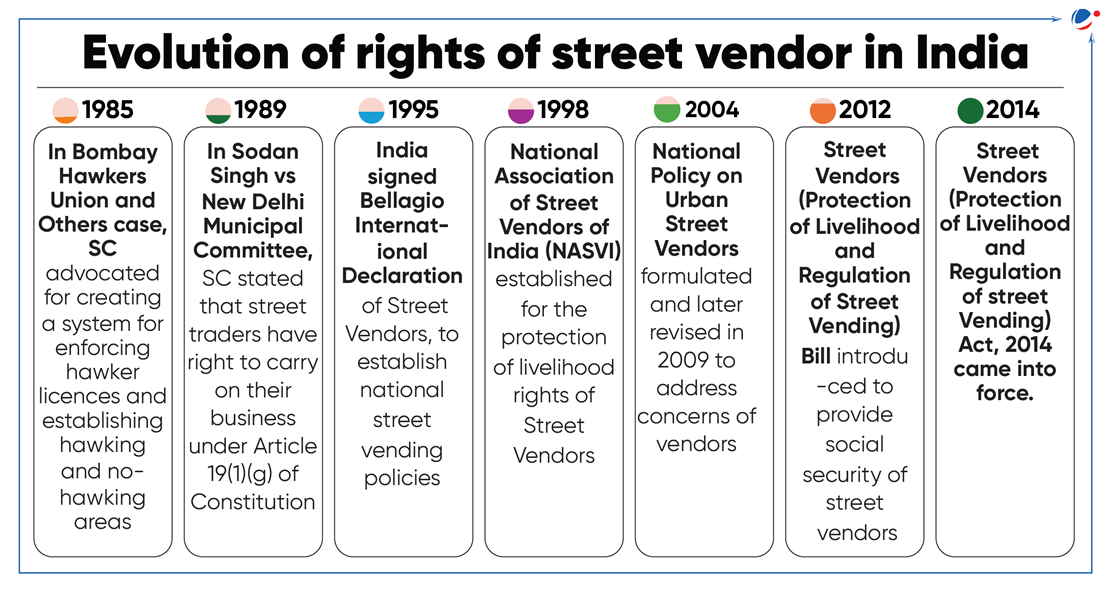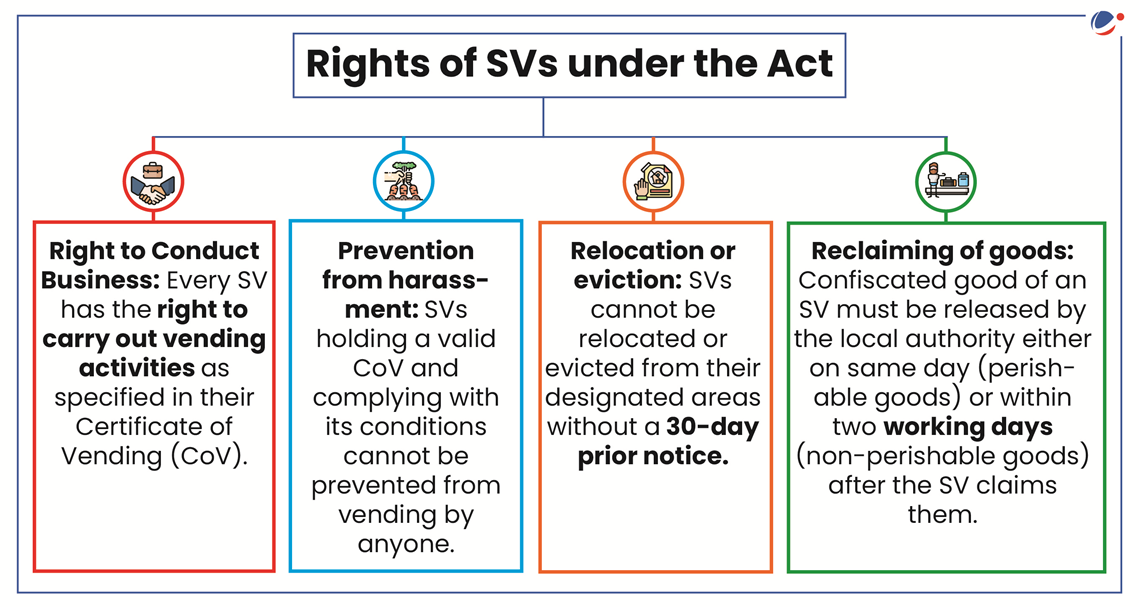Why in the news?
Recently, the enactment of the Street Vendors (Protection of Livelihood and Regulation of Street Vending) Act 2014 completed 10 years.
About Street Vendors
- Current status: The number of street vendors is expected to be around 10 million. Cities like Delhi and Mumbai have the largest share. Most of them are migrants.
- Contribution to economy: According to government estimates, street-vending accounts for 14% of the total (non-agricultural) urban informal employment in the country.
- For poor, Street vending acts as the best opportunity for self-employment with the lowest capital
Constitutional Provisions related to Street Vendors
|
Challenges faced by street vendors:
- Financial insecurity due to low income, irregular employment and sale fluctuation, further impacts access to formal credit services.
- Poor working conditions such as long working hours, harsh weather conditions like heatwave, lack of access to shelter, transportation, storage facilities etc.
- Women face issues of access to basic facilities such as sanitation, also face security issues including eve-teasing, sexual harassment, etc.

About Street Vendors (Protection of Livelihood and Regulation of Street Vending) Act, 2014
Background
- Since street vending is part of the unregulated informal economy and is therefore generally criminalized by city officials, police officers, wholesalers, Resident Welfare Associations (RWAs), and many residents themselves.
- Despite India's National Policy on Urban Street Vendors recognizing street vending positively the main challenge to include street vendors in urban planning remained unresolved.
- In this background, over the years many organisations including NASVI and the Supreme Court have repeatedly called for "structured regulation and legislation to control and regulate the fundamental right of hawking."
Key provisions
- Defines Street Vendor (SV): A person engaged in vending of articles, goods, food items or offering services to the general public in a street, lane, footpath, or by moving from place to place.
- Defines vending zones: It refers to an area or a place or a location designated as such by the local authority for the specific use by street vendors for street vending and includes footpath, sidewalk, pavement, etc.
- Vending zones can only accommodate up to 2.5% of the population of a ward/ zone/ town/ city.
- Street vending plans (SVPs): Local authorities must frame SVPs which should cover:
- identification of vending zones,
- spatial plans for street vendors, and
- establishing measures for efficient, and cost-effective distribution of goods and services.
- Enumerates duties
- Duty of SV: Adherence to local laws and regulations, payment of vending fees, and compliance with hygiene and safety standards.
- Duty of Government: Appropriate Government may undertake promotional measures of making available credit, insurance and other welfare schemes of social security for the street vendors.

Key Bodies established under the Act
Town Vending Committees (TVCs) | Grievance Redressal Committees (GRC) |
|---|---|
|
|
Challenges in implementation of the Street Vendors Act, 2014
Parliamentary Standing Committee on Urban Development has highlighted the following challenges in the implementation of the Act:
- Suboptimal registration of street vendors: Identity cards and CoV that provide legal rights to SV to conduct their businesses have not been issued to all vendors.
- Persistence of vulnerability to eviction:
- TVCs have not been constituted in several states, leaving street vendors vulnerable to eviction.
- 60% of a TVC is composed of government-nominated officials. This may overshadow concerns raised by SV representatives.
- Lax implementation by States:
- Many provisions of the Act are yet to be implemented by several states/ union territories.
- Only 31% of towns in states which have notified a scheme under the Act have framed Street vending plans.
- Certain states like Assam have notified vending zones without formulating the vending plans.
- Only nine states (including Assam, Kerala, and Punjab) have constituted GRCs.
- Exclusionary urbanisation: Many cities are being developed as smart cities or are formulating master plans without consideration of the street vendors.
Other Initiatives taken to safeguard Street Vendors in India
|
Way forward
Recommendations by the Parliamentary Standing Committee on Urban Development for effective implementation of the Act:
- Issuance of Smart card: Provide SVs smart cards with relevant information (such as identification and details of vending certificate), which may also be more durable compared to paper-based documents.
- Strengthen TVCs:
- Expedite constitution of TVCs in all states. Also, ensure that no eviction or relocation should be enforced without consultation with TVCs.
- The SV representation in the TVCs should be regularly monitored and a database of the representation should be maintained by the Ministry of Housing and Urban Affairs (MoHUA).
- Ensure inclusive urbanisation: MoHUA shall issue guidelines for:
- integrate the Act with developmental missions and urban planning processes,
- consultation with the TVCs while planning projects under the smart city mission,
- ensure representation of the vendor community in the Committee formulating the master plan of a city.
- Enhancing Implementation:
- Encourage the constitution of GRCs and develop a website or mobile application to ensure traceability, accountability, and transparency in the complaint redressal process.
- Constitute a monitoring committee to review the progress of implementation, and share good practices for implementing the Act.
- Conduct annual surveys similar to the Swachh Survekshan to recognize and incentivize effective implementation by urban local bodies.



